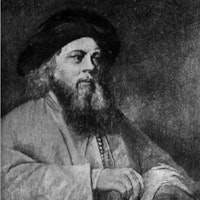In All That Is in This World
Topic: Spiritual Growth & Practice
“In all that is in this world dwell holy sparks, no thing is empty of them. In the actions of men also, indeed even in the sins that a man does, dwell holy sparks to the glory of God. And what is it that the sparks await that dwell in the sins? It is the turning [repentance]. In the hour when you turn on account of sins, you raise to the higher world the sparks that were in it.”
Israel ben Eliezer, more commonly known as the Baal Shem Tov or Besht, was born around 1700 and is celebrated as a seminal figure in Jewish mysticism. Rising from humble beginnings, his charismatic teachings reshaped the spiritual landscape of Eastern Europe, laying the foundation for Hasidic Judaism. His life's work revolved around promoting spirituality through joyous religious observance and fervor, countering the more scholarly approach prevalent during his time. He employed stories, parables, and a deep understanding of the Kabbalah, Jewish mysticism, to bring about a spiritual renaissance.
Baal Shem Tov's teachings emphasized a personal relationship with God, the inherent holiness in all aspects of life, and the idea that the divine can be found in the simplest of things. He famously said that everything in the world, even a leaf falling from a tree, is part of a divine plan. The Besht's mystical approach resonated with the Jewish masses, who may have found traditional Talmudic studies inaccessible. His legacy was the birth of Hasidism, a movement characterized by its emphasis on mysticism, spirituality, and joyous service to God.
The influence of the Baal Shem Tov has not only permeated centuries but has also touched contemporary luminaries. Rabbi Jonathan Sacks, the former Chief Rabbi of the United Hebrew Congregations of the Commonwealth, frequently drew upon Hasidic teachings in his work, indicating a clear influence from the Besht. Additionally, Rabbi Adin Steinsaltz, an internationally regarded scholar and educator, wrote extensively on the Talmud and Kabbalah while highlighting the essence of the Baal Shem Tov's teachings in his spiritual approach. Thus, the teachings of Israel ben Eliezer continue to inspire and guide many in their spiritual journey.
Wilson, Andrew, editor. World Scripture II. Universal Peace Federation, 2011, p. 333 [Israel Baal Shem Tov].

Israel Baal Shem Tov
Theme: Spiritual Growth


In all that is in this world dwell holy sparks
Israel Baal Shem Tov
Related Quotes
Copyright © 2017 – 2026 LuminaryQuotes.com About Us